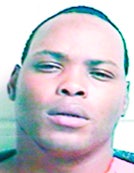Floyd avoids life in prison
Published 10:07 pm Friday, March 15, 2013
A jury returned a guilty verdict in a promoting prison contraband case against Cedric Floyd — but it wasn’t the verdict the prosecutors were hoping to hear.
Floyd, who has been incarcerated at the Escambia County Detention Center for nearly two years on a capital murder charge, faced a possible life sentence if the jury had found him guilty of a first-degree offense of promoting prison contraband.
After hearing testimony and arguments by attorneys for the defense and prosecution, the jury rendered a verdict of not guilty on the first-degree charge but did find Floyd guilty of the charge in the third degree — a misdemeanor offense.
The case centered around a tip given to jail staff concerning Floyd’s possession of a cell phone, according to testimony.
Kevin McKinley and Charles Johns were Floyd’s attorneys, with Conecuh County District Attorney Steve Wallington and assistant Todd Watson prosecuting the case.
Wallington and Watson were appointed to the case after Circuit Judge Bert Rice removed the Escambia County District Attorneys from prosecuting any cases against Floyd. In the action taken in November 2012, Rice agreed that current assistant district attorneys had in fact represented Floyd in previous cases as public defenders.
Escambia County Chief Deputy Mike Lambert and Jailer Sgt. James Ward testified Thursday about the promoting prison contraband charge levied against Floyd.
McKinley told the jury the charges could not be considered a first-degree offense unless they believed Floyd held the cell phone with plans to use it to aid in an escape.
“The state is asking you to bow down to what their version of the offense really is,” McKinley said. “We are asking you not to bow down but to stand up and say no.”
Not mentioned during testimony was the fact that Floyd actually did escape from the county jail in October. He was captured a day later in Pensacola.
McKinley explained to jurors that Floyd’s possession of the cell phone was not a reason to believe he would be using the device in an attempt to escape from the jail.
“We are asking you to send a message on how you view a cell phone,” McKinley said. “Is a cell phone an escape device or does it just violate a jail rule? I contend it is not an escape device.”
In prosecuting the case, Wallington told jurors to consider the facts in the case and the circumstances surrounding the incident.
“Sgt. Ward performed a strip search on Mr. Floyd and found a cell phone he had between his legs trying to conceal after he had been asked to take off his clothes,” Wallington said. “He was already in jail on a capital murder charge. A cell phone in his possession is different from someone with a cell phone who is in jail on a bad check charge. I don’t know if he was planning an escape, but he could use it.”
In Circuit Judge Bert Rice’s instructions to the jury, jurors were asked to render a verdict of guilty or not guilty on either a first-degree or third-degree charge of promoting prison contraband.
McKinley said the verdict of guilty on a third-degree charge kept his client from being put behind bars for the rest of his life.
“This guilty verdict is only punishable by no more than a year in county, which he has already served,” McKinley said. “Had he been convicted, and with his prior record, he could have gotten life. As it is, he was only sentenced to a year for the misdemeanor.”
Floyd will remain behind bars as he awaits trial on the capital murder charge against him stemming from a January 2011 case.
Floyd stands accused of the shooting death of Tina Roshell Jones of Atmore who investigators believe was in a “dating” relationship with Floyd at the time of the shooting.
Although no specific date has been set to hear the case on the murder charge, a September trial date is possible. Floyd will remain behind bars with no bond until a trial is set.





